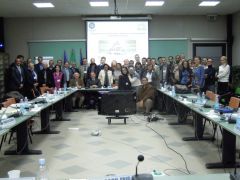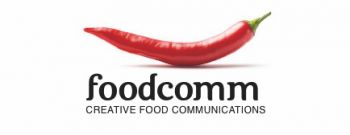A Call for Action for Sustainability of the Mediterranean Diet,
CIHEAM-Bari, 26 May 2011

Considering that most current agro-food systems are not sustainable due to loss of biodiversity, natural resources degradation, climate change, high energy input, erosion of the Mediterranean diet, urgent measures are needed to promote and disseminate the concept of “sustainable diets” in the various contexts worldwide, both in industrialized and in developing countries.
“...Sustainable diets are those diets with low environmental impacts which contribute to food and nutrition security and to healthy life for present and future generations. Sustainable diets are protective and respectful of biodiversity and ecosystems, culturally acceptable, accessible, economically fair and affordable; nutritionally adequate, safe and healthy; while optimizing natural and human resources.” (International Scientific Symposium on “Biodiversity and Sustainable Diets - United against Hunger”, 3-5 November 2010, FAO-Rome).
Based on such a shared definition, the secretariat of the Cross-cutting Initiative on Biodiversity for Food and Nutrition (Convention on Biological Diversity, FAO and Bioversity International) welcomes CIHEAM’s[1] proposal to collaborate in the organization of the International Workshop to be held in Bari in November 2011 to formulate Guidelines for the Sustainability of the Mediterranean Diet.
These Guidelines comprise the following elements:
- Features of the Mediterranean diet common to the different Mediterranean food cultures;
- steps and measures to safeguard and promote the Mediterranean diet; and
- recommendations for multi-sectoral policy instruments to ensure the sustainability of the Mediterranean agro-food systems.
The workshop will also identify the characteristics of the Mediterranean diet that can serve as a model for sustainable diets in other ecosystems.
The Mediterranean Diet was recognized by UNESCO, in November 2010, as
intangible cultural heritage of humanity[2].
On May 26, 2011, the Steering Committee[3] of the International Workshop held its first meeting at CIHEAM-Bari to prepare the program around the following research and action priority areas:
- contribution of the Mediterranean diet to biodiversity promotion in Mediterranean agro-food systems;
- social and economic sustainability of the Mediterranean diet;
- nutrition and health aspects of the Mediterranean diet;
- relationship between the Mediterranean diet and traditional knowledge in Mediterranean communities;
- environmental impacts of Mediterranean agro-food systems on natural resources in the region, particularly climate change.
The Steering Committee invites national and regional governments of the MediterraneanBasin, International Organizations, research institutions, civil society and the private sector to contribute to the success of the workshop.
[1] Istanbul, May 8, 2010: Final declaration of the 8th Meeting of the Ministers of Food, Agriculture, and Fisheries of CIHEAM’s Member Countries: ”Work to promote a healthy and sustainable regional food production system following the standards of the Mediterranean diet that foster the spirit of conviviality and favor consumption of local and seasonal products, particularly by encouraging regional networks to support public decisions for the protection, promotion and marketing of Mediterranean products and the development of environmentally sound agricultural production systems”.
[2] « … derives from the Greek word “diaita” – way of living – it is a social practice based on “know-how, knowledge, and traditions ranging from the landscape to the table and that concern, in the Mediterranean basin, cultures, harvest, fishery, conservation, preparation, cooking and, in particular, the way of consuming» (http://www.unesco.org/culture/ich/index.php?lg=en&pg=00011&RL=00394)
[3] Barbara BURLINGAME (FAO – Rome), Martina OTTO, (UNEP – Paris), Roberto CAPONE (CIHEAM Bari), Denis LAIRON (FENS – Marseille), Rekia BELHASEN (IUNS – Morocco), Martine PADILLA (CIHEAM – Montpellier), Massimo Iannetta, (ENEA, Rome), Habiba HASSAN-WASSEF, (NRC - Egypt) , Joan Reguant (FDM Barcelona), Sandro DERNINI (FAO Rome), Stefano PADULOSI (Bioversity International - Rome), Xavier MEDINA (ICAF – Europe)
-
Sorry, no records to display.






